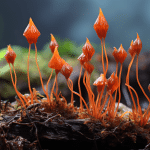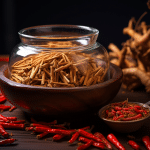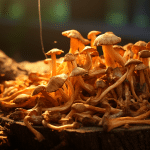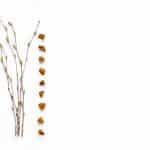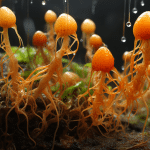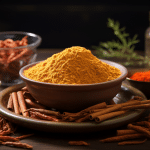Lion’s mane and Cordyceps are two of the most powerful medicinal mushrooms in nature. Both are high-functioning mushrooms that stimulate the brain, the body, and the immune system in a unique way. When it comes to Lion’s Mane vs. Cordyceps, which one is best for you? Let us weigh in on the health benefits of each functional mushroom extract to help you make your decision.
Lion’s Mane vs Cordyceps: How Do These Adaptogens Stack Up?
Heres some good news for you:
- Each may boost immune function
- Have potential anti-cancer activity
- May support healthy blood sugar levels
- May have anti-aging properties
- May reduce your risk of heart disease
However, they are often used for different reasons.
Cordyceps is commonly used to promote energy and stamina, a favorite of athletes. Lion’s mane is generally used for its cognitive benefits, and is used by those looking for a mental edge.
So if you’re looking for improved athletic or exercise performance, cordyceps is going to be best for you. If you’re looking for improved focus and cognitive performance, lion’s mane will be best for you.
Lion’s Mane Mushroom Vs Cordyceps Mushroom: Can You Take Both?
Many a medicinal mushroom connoisseur like to “stack” his mushrooms to get an intensive immune-supporting, brain-boosting, antioxidant-boosting punch. The lion’s mane-cordyceps combo is especially amazing, as it gives you both the nootropics and the physical-enhancement properties to get firing on all mental and physical cylinders. In fact, you can combine different types of mushroom products such as reishi mushrooms (the mushroom of immortality), turkey tail (ultimate immunity protection), chaga mushrooms, shiitake mushrooms, maitake, and more. You will get a wide range of beta-glucans to support your body and immune system at many levels. Whatever you decide, what is most important is to eat your functional mushrooms every day as consistency is key to get the most benefits.
How to Take Lion’s Mane and Cordyceps
It is not hard to include lion’s mane or cordyceps, but also turkey tail, reishi mushrooms, shiitake mushrooms, and others, in your diet, and you do not have to turn on your stove. Medicinal mushroom extracts are powders that you can easily add to smoothies, teas, mushroom coffee, and other recipes. Plus, the mushrooms are already extracted, so you do not need to worry about steeping them in hot water to draw out their useful compounds. Simply drop a spoonful in a beverage and you are ready to go.
Adaptogens need several weeks to accumulate in your system before you begin to see the benefits and health results. Do not expect to see results immediately. Give it a couple weeks of consistency, see how you feel, then tweak the stack!
More About Lion’s Mane Mushroom
The words beautiful and mushrooms generally do not go together (at least not with mushroom enthusiasts), but lion’s mane is an exception. You cannot miss this medicinal mushroom, thanks to the flowing white to off-white threads that gave it its name. Those strands are technically called teeth. Lion’s mane is part of a fungus group called teeth mushrooms, which have similar shapes.
Also known as Hericium erinaceus, lion’s mane grows in cold climates on hardwood trees across North America, Europe, and Asia. In terms of taste, many compare lion’s mane to lobster or crab. However, you can get lion’s mane benefits via the handy powders and extracts from mushrooms.
Let’s Look At Some of The Health Benefits of Lion’s Mane
Lion’s mane mushroom is a potent mushroom which works like a nootropic, supporting the mental health and nervous system at several levels thanks to it is high concentrations of beta-glucan, polysaccharides, antioxidants, and other powerful substances. It has the potential to enhance short-term memory and other cognitive deficiencies. Speeding the recovery from neurological or neurological injuries, especially stroke. Nerve growth factor (NGF) is vital to combating age-related brain diseases and keeping your mind sharp.
Some studies show lion’s mane mushrooms may also help with symptoms of depression and anxiety. Experts think chronic inflammation plays a key role in many cases of depression. The unique anti-inflammatory effects of lion’s mane reduce symptoms of anxiety and depression, while targeting and rebuilding the specific areas of the brain that are responsible for these conditions.
You can find our favorite capsules, powders, and tincture’s on the following pages of our website and learn more about each individually:
Our Favorite Lion’s Mane Supplements
Our Favorite Lion’s Mane Powders
Our Favorite Lion’s Mane Tinctures
Our Favorite Lion’s Mane Gummies
What is Cordyceps Mushroom?
Cordyceps is not a typical Cap-n-Stem mushroom. Some species of cordyceps, such as the one called cordyceps sinensis, are parasitic mushrooms that grow on insects, usually caterpillars. The fungus starts growing on a bugs head, causes some kind of psychosis, and takes over an insects brain in order to disperse its spores.
In most traditional extracts of cordyceps, such as those offered by the brands we feature on this website and the other brands we feature on this site, modern methods have allowed us to make cordyceps without using insects. Cordyceps, by nature, need a high level of humidity in order to thrive. You can find them in Asian countries such as Nepal, China, and Vietnam. Like lion’s mane, the king of mushrooms, the cordyceps is a mainstay of Chinese medicine as well.
Some of the Main Benefits of Cordyceps
Cordyceps is a great option not only to help your immune system, but to get more out of training as well. Studies have shown taking cordyceps before working out boosts ATP production (which is what every cell in your body uses for energy). Not only that, cordyceps has a beneficial impact on oxygen uptake.
In 1993, Chinas Olympic track and field women’s team broke three world records in one competition. The press immediately leaked allegations of doping, but Chinese women eventually revealed cordyceps was their secret weapon!
While lion’s mane reduced mental and nervous system inflammation, cordyceps worked on multiple levels as a physical anti-inflammatory. Studies have shown the intriguing mushroom combats inflammation on the skin when applied topically. Cordyceps also works as an anti-inflammatory to the respiratory system to protect against asthma attacks. Because the bioactive compounds in cordyceps prevent your body from producing inflammatory enzymes, you may want to seek it out as a natural Motrin alternative for different types of physical inflammation.
Additional Resources:
Lion’s Mane Spiritual Benefits
Updated 10/11/2022








